Press releases
Nikol Pashinyan: “We abide by a high-paid wage policy to encourage highly qualified professionals"
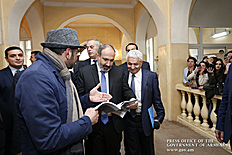 1670x1113px - 578 Kb
1670x1113px - 578 Kb 1670x1113px - 587 Kb
1670x1113px - 587 Kb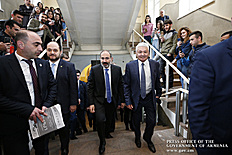 1670x1113px - 597 Kb
1670x1113px - 597 Kb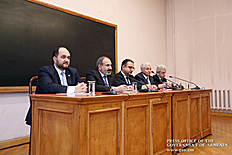 1670x1113px - 581 Kb
1670x1113px - 581 Kb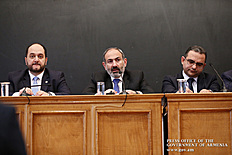 1670x1113px - 584 Kb
1670x1113px - 584 Kb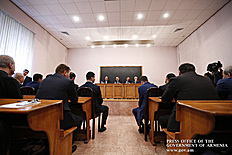 1670x1113px - 537 Kb
1670x1113px - 537 Kb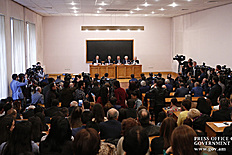 1670x1113px - 609 Kb
1670x1113px - 609 Kb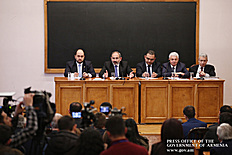 1670x1113px - 507 Kb
1670x1113px - 507 Kb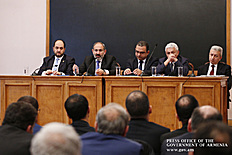 1670x1113px - 547 Kb
1670x1113px - 547 Kb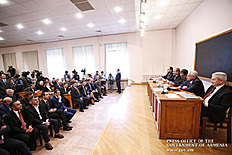 1670x1113px - 622 Kb
1670x1113px - 622 Kb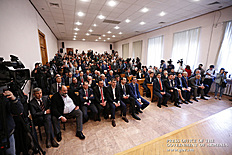 1670x1113px - 706 Kb
1670x1113px - 706 Kb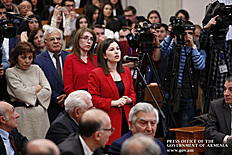 1670x1113px - 600 Kb
1670x1113px - 600 Kb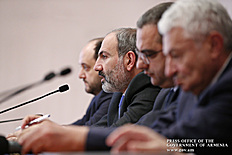 1670x1113px - 465 Kb
1670x1113px - 465 Kb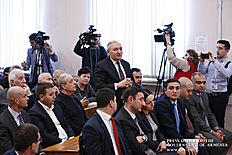 1670x1113px - 553 Kb
1670x1113px - 553 Kb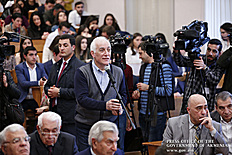 1670x1113px - 631 Kb
1670x1113px - 631 Kb
more 12 photos
Prime Minister Nikol Pashinyan today visited Yerevan State University and met with professors and students from the Faculty of Economics and Management.
Welcoming those present, Prime Minister Pashinyan stressed the importance of discussions held in this. He addressed the vision of economic revolution.
“I want to explain with some parameters what we mean by saying “economic revolution” in terms of result and method. We have already indicated that the vision of the economy of the Republic of Armenia is as follows: Armenia should become a high-tech country and the technology sector should become the engine of its economy. To clarify this wording in more detail, I can emphasize that our vision is that in 10 years, the 10 or 20 largest companies in Armenia should be companies in the technology sector, unlike today, when the biggest taxpayers are those representing natural or non-natural monopolies, or in the mining industry,” the Head of Government said. According to Nikol Pashinyan, as a driving force of the economy, the driving force is both soft and hard technologies.
The Prime Minister emphasized that the next important point is that Armenia should be a country where the workforce is highly skilled. “In our opinion, the Republic of Armenia should give up the status of a country with low-skilled manpower, which means that our country’s workforce should be highly skilled. And here is the next chain of the economic revolution, which is of course related to education. It follows that we must make profound changes in the field of education, and the main objective of these reforms should be that the education system be able to prepare highly qualified students. Our main vision in this regard is that the research component of higher education should gradually increase. Research and scientific work should become more important in the scientific system and, over time, this direction should be strengthened,” Nikol Pashinyan said.
The Prime Minister presented the vision of Armenia’s economic development according to which the government of the Republic of Armenia should carry out a high remuneration policy. “One of the most important tools of our high-wage targeted policy is the provision on a flat income tax in the Tax Code of the Republic of Armenia, with the precondition that the tax on income should be reduced in 3-4-5 years to 20% of the flat tax. We believe that we are thereby encouraging the well-paid manpower in the country and, therefore, encourage education and highly qualified specialists. In general, it should be noted that by saying “highly qualified specialist” we mean not only the technological field, but also the fact that the stock exchange system in the Republic of Armenia will develop significantly in the near future.”
Nikol Pashinyan noted that the Government is also trying to find state-owned companies with marketable shares in the Republic of Armenia in order to encourage private companies to follow this path with some adjustments. According to the Head of Government, the banking and tertiary sectors are developing successfully, and it is possible to attract highly qualified specialists there. At the same time, even with great effort, it will be impossible to bring the potential workforce to the same level of qualification and a certain split here is inevitable.
“To address the problems stemming from this divide, we have declared agriculture as a priority sector which, in fact, is also related to technology, and the tourism sector as well. We believe that part of labor that does not fit our high-skilled segment can be integrated into this section, providing a specific development dynamics for small and medium-sized enterprises, ensuring a certain level of welfare, providing for some possibility of individual effort,” Nikol Pashinyan said.
Regarding the method of implementation of the economic revolution, Prime Minister Pashinyan said: “As with the political revolution, here, too, individual effort is the main and most important tool. In other words, our main tool should be to encourage citizens to change their economic behavior both as an object and subject of economic activity.”
In conclusion, Prime Minister Pashinyan answered questions from professors and students of the Faculty of Economics and Management of Yerevan State University about the effective implementation of Armenia’s economic development model, the cooperation between the government and the economic community, the promotion of local expertise potential, the reform of the education system, the formation of the education-science-research-labor market chain, the training of qualified specialists in the system of higher education, the encouragement of human capital, intellectual work and individual effort, the establishment of a national air carrier, the formation of a national ideology, the settlement of the Nagorno-Karabakh conflict, etc.